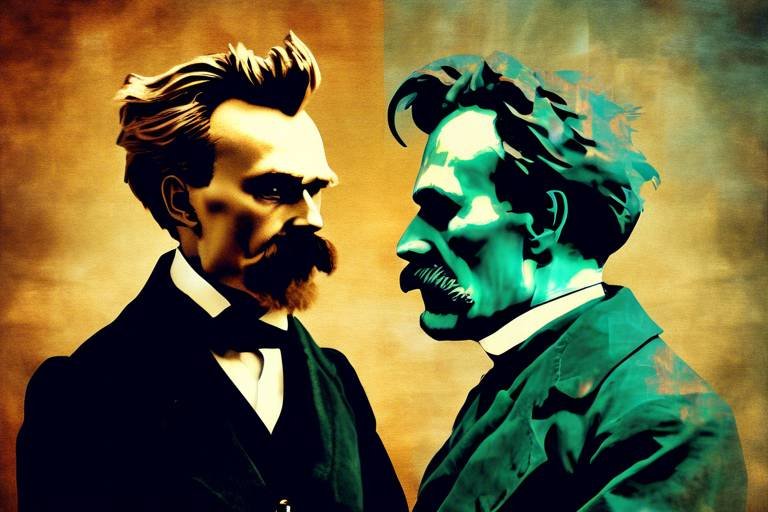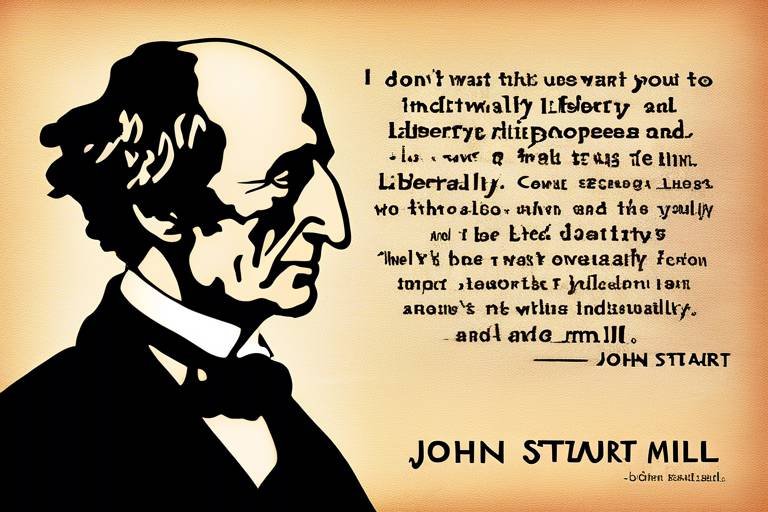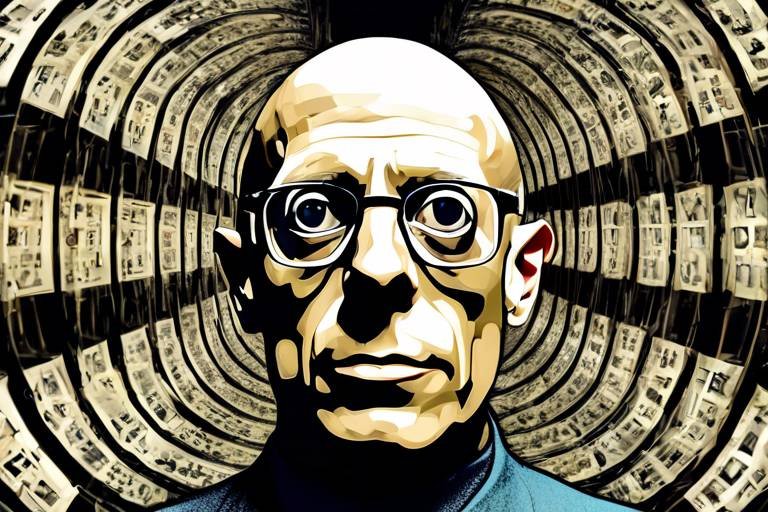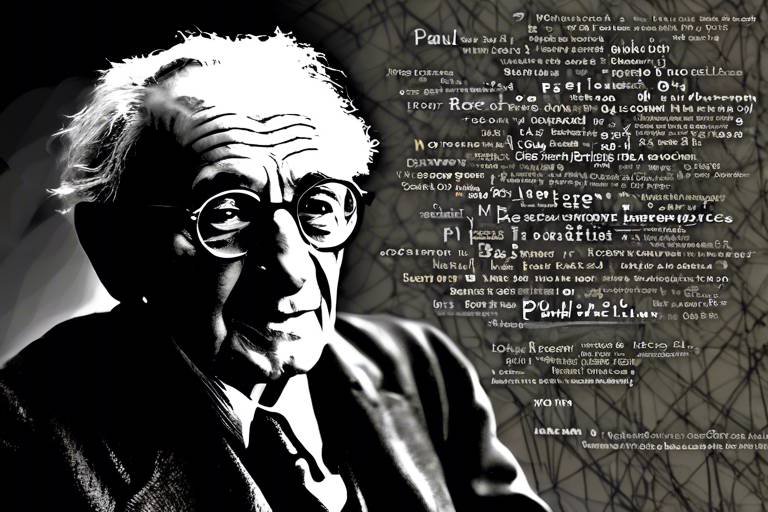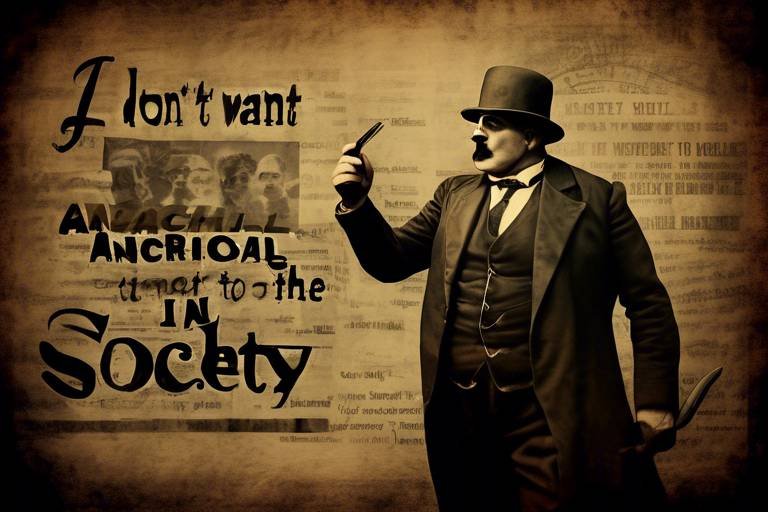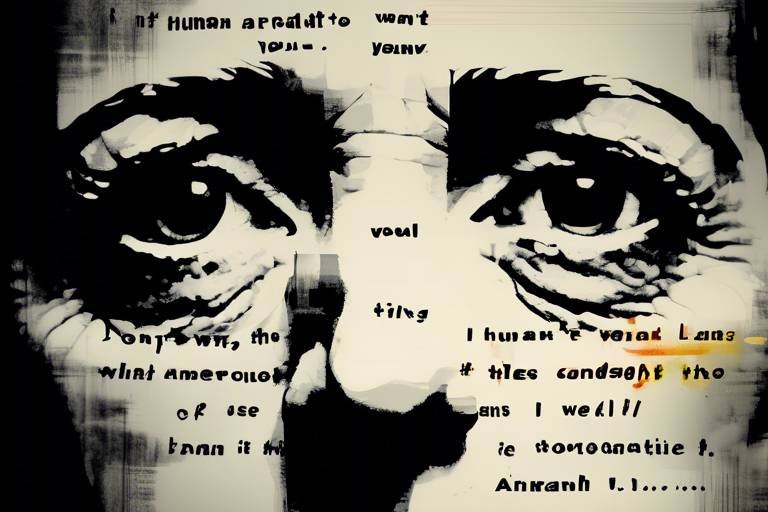Revisiting Thoreau's Philosophy of Civil Disobedience
Henry David Thoreau, a name synonymous with the idea of civil disobedience, has left an indelible mark on political philosophy and social justice movements. His essay, "Civil Disobedience," serves as a clarion call for individuals to stand against unjust laws and government actions. But what does it truly mean to practice civil disobedience? Is it merely a rebellious act, or is it rooted in a deeper moral obligation? In this article, we will explore the core principles of Thoreau's philosophy, the historical context in which he wrote, and the relevance of his ideas in today's world. As we navigate through the complexities of social justice, we will uncover how Thoreau's thoughts resonate with contemporary movements and ethical dilemmas.
Thoreau’s philosophy is not just a relic of the past; it is a living, breathing doctrine that inspires countless activists today. From the abolitionist movement to modern-day protests, his ideas about individual conscience, moral responsibility, and the power of peaceful resistance have shaped the way we view activism. But let’s take a step back and understand the origins of his philosophy. What were the societal conditions that prompted Thoreau to advocate for civil disobedience? How did his personal beliefs and experiences influence his writings?
To truly grasp Thoreau's impact, we must delve into the historical context of his time. The mid-19th century was a period marked by intense social upheaval in America, with issues like slavery and territorial expansion igniting passionate debates. Thoreau's own experiences with injustice—particularly his opposition to the Mexican-American War and slavery—served as catalysts for his philosophy. He believed that individuals should not blindly follow laws that conflict with their moral compass. Instead, they should actively resist such laws through nonviolent means.
As we explore the moral imperative of resistance, we find that Thoreau's argument is rooted in a profound sense of ethics. He posited that unjust laws are a form of violence, and that individuals have a duty to oppose them. This notion raises critical questions: Are we complicit in injustice when we remain silent? How far should one go to resist laws that are fundamentally wrong? Thoreau's writings challenge us to reflect on our own responsibilities in the face of societal injustices.
In the following sections, we will examine the influences that shaped Thoreau's philosophy, including the transcendentalist movement and the abolitionist struggle. We'll also analyze his key works, particularly "Civil Disobedience," to understand how his arguments continue to resonate in contemporary social movements. By the end of this exploration, it will be clear that Thoreau's philosophy is not just historical; it is a guiding light for anyone seeking justice in a complex world.
- What is civil disobedience? Civil disobedience is the act of intentionally disobeying a law or regulation to protest against perceived injustice, often through nonviolent means.
- Why is Thoreau important in discussions of civil disobedience? Thoreau's essay "Civil Disobedience" articulates the moral foundation for resisting unjust laws, influencing many social movements and leaders.
- How did Thoreau's personal beliefs influence his philosophy? Thoreau's opposition to slavery and war, along with his transcendentalist beliefs, shaped his views on individual conscience and moral responsibility.
- Can Thoreau's philosophy be applied today? Yes, Thoreau's ideas continue to inspire contemporary movements, encouraging individuals to resist injustice and advocate for change.

The Origins of Civil Disobedience
To truly grasp the essence of civil disobedience, we must journey back to the mid-19th century, a time when the United States was grappling with profound moral and political dilemmas. At the heart of this tumultuous period was Henry David Thoreau, a philosopher and naturalist whose thoughts on individual conscience and social responsibility would resonate through the ages. Thoreau's seminal essay, Civil Disobedience, penned in 1849, serves as a cornerstone for understanding the philosophy of resisting unjust laws. But what exactly led him to advocate such a bold stance?
Thoreau's philosophy was not born in isolation; it was a product of the socio-political climate of his time. The United States was embroiled in issues such as slavery and imperialism, which posed significant ethical questions for its citizens. Thoreau believed that when the government enacts laws that contradict moral principles, individuals have the duty to oppose such laws. This notion of moral obligation is what sets civil disobedience apart from mere law-breaking; it is a conscious choice to act against injustice for the greater good.
In his essay, Thoreau famously stated, “That government is best which governs least.” This phrase encapsulates his belief in minimal government intervention in the lives of individuals. He argued that a government that enforces unjust laws loses its legitimacy, and thus, citizens must rise against it. The abolitionist movement played a crucial role in shaping his views, as he witnessed firsthand the atrocities committed under the guise of law. The moral imperative to resist was not just a philosophical stance for Thoreau; it was a call to action.
Moreover, Thoreau's ideas were deeply influenced by transcendentalism, a philosophical movement that emphasized the inherent goodness of people and nature. This belief in the sanctity of individual conscience led Thoreau to advocate for personal responsibility in the face of injustice. He saw civil disobedience as a form of moral resistance, where individuals must listen to their conscience rather than blindly follow laws that are fundamentally flawed.
In essence, the origins of civil disobedience as articulated by Thoreau can be traced back to a combination of personal conviction, social context, and philosophical influences. His writings challenge us to reflect on our own moral compass and consider the implications of our actions in the face of injustice. As we navigate the complexities of modern society, Thoreau's insights remain as relevant today as they were in his time, urging us to stand firm against laws that undermine our fundamental values.

The Moral Imperative of Resistance
Henry David Thoreau’s philosophy on civil disobedience is fundamentally anchored in the belief that individuals possess a moral obligation to resist unjust laws. This idea is not merely a theoretical concept; it’s a call to action that resonates deeply within the human conscience. When faced with laws that contradict our ethical beliefs, Thoreau advocates for a courageous stand. He argues that it's not just a right but a duty to oppose injustice, even if it means facing legal repercussions. Imagine standing at a crossroads where one path leads to compliance with injustice, while the other demands a brave confrontation of the status quo. Thoreau encourages us to take the road less traveled, the one that echoes our inner convictions.
To Thoreau, the act of civil disobedience is an expression of individual conscience, a personal declaration that one will not be complicit in wrongdoing. He famously stated, "Under a government which imprisons any unjustly, the true place for a just man is also a prison." This striking assertion highlights the profound ethical dilemma faced by individuals when their government enacts laws that are fundamentally at odds with justice. In essence, Thoreau paints a vivid picture of moral courage, challenging us to weigh the cost of our inaction against the price of our principles.
Moreover, Thoreau’s philosophy prompts us to consider the broader implications of our actions. When we resist unjust laws, we not only affirm our own integrity but also inspire others to reflect on their values. This ripple effect can lead to a collective awakening, where communities unite against oppression. In this sense, civil disobedience transforms from a solitary act into a powerful movement, fueled by shared ideals and communal strength. It’s akin to lighting a torch in a dark room; one small flame can illuminate the path for many others.
Thoreau’s arguments also delve into the ethical dimensions of resistance. He believed that passive acceptance of injustice is tantamount to complicity. This perspective encourages individuals to critically assess the laws that govern them and to question their morality. Are these laws just? Do they reflect the values we hold dear? Thoreau challenges us to engage in this introspection. He emphasizes that true justice cannot be achieved through silence and inaction; rather, it requires a bold confrontation of the systems that perpetuate inequality.
In today's world, this moral imperative resonates even louder. As we witness various forms of injustice—be it racial discrimination, environmental degradation, or economic inequality—Thoreau's insights remind us that the responsibility to act rests on our shoulders. The modern activist embodies this spirit of resistance, drawing from Thoreau’s teachings to fuel their fight for justice. They remind us that our voices matter, and that standing up against the tide of injustice is not just a personal choice, but a societal necessity.
In conclusion, Thoreau’s philosophy of civil disobedience is a profound reminder of our moral duty to resist unjust laws. It calls upon us to listen to our conscience, to question the status quo, and to act with integrity. As we navigate the complexities of modern society, let us remember Thoreau’s powerful message: to be just is to be brave, and to resist is to embody the very essence of humanity.
- What is civil disobedience? Civil disobedience is the active, professed refusal to obey certain laws, demands, and commands of a government or occupying power.
- Why is Thoreau important in the context of civil disobedience? Thoreau’s essay "Civil Disobedience" outlines his philosophy that individuals should not allow governments to overrule or atrophy their consciences.
- How can Thoreau's ideas be applied today? Thoreau's ideas can be applied in contemporary movements advocating for social justice, environmental protection, and human rights, encouraging individuals to take a stand against injustice.

Thoreau’s Influences
Henry David Thoreau was not a lone wolf in his advocacy for civil disobedience; rather, he was a product of a rich tapestry of philosophical thought and social movements that shaped his worldview. To truly grasp the essence of Thoreau's philosophy, it’s essential to look at the influences that molded his ideas. Two major currents that significantly impacted him were transcendentalism and the abolitionist movement.
Transcendentalism, a philosophical movement that emerged in the early 19th century, emphasized the inherent goodness of people and nature. It posited that individuals could transcend the physical world and connect with a higher spiritual reality. Thoreau, a key figure in this movement, believed that personal conscience should guide one’s actions over societal norms. He famously stated, “That government is best which governs least,” suggesting that a person’s moral compass should lead them, especially when faced with unjust laws. This belief in individualism and self-reliance encouraged many to challenge societal norms and fight against injustices.
Furthermore, the abolitionist context in which Thoreau lived deeply influenced his philosophy. The fight against slavery was not just a political issue for him; it was a moral imperative. Thoreau was actively involved in the abolitionist movement, and his interactions with prominent abolitionists like Frederick Douglass and William Lloyd Garrison helped to solidify his views on civil disobedience. He believed that silence in the face of injustice was complicity, and he urged individuals to take a stand against the oppressive systems of their time. This period was marked by a growing awareness of social justice, and Thoreau’s writings reflect a profound commitment to resist any laws that perpetuated human suffering.
The intersection of these influences is evident in Thoreau’s seminal work, Civil Disobedience, where he articulates the necessity of resisting unjust laws as a form of moral duty. His philosophical outlook was not just theoretical; it was a call to action, urging individuals to evaluate their own principles and act accordingly. In this way, Thoreau's influences can be seen as a combination of personal conviction and a broader social consciousness, making his philosophy relevant not only in his time but also in contemporary discussions about justice and moral responsibility.
In summary, Thoreau’s philosophy of civil disobedience was significantly shaped by the ideals of transcendentalism and the moral urgency of the abolitionist movement. These influences not only informed his thoughts but also provided a framework for understanding the ethical dimensions of resisting injustice. As we explore Thoreau's legacy, it becomes clear that his ideas continue to resonate, inspiring generations to question the status quo and advocate for a more just society.
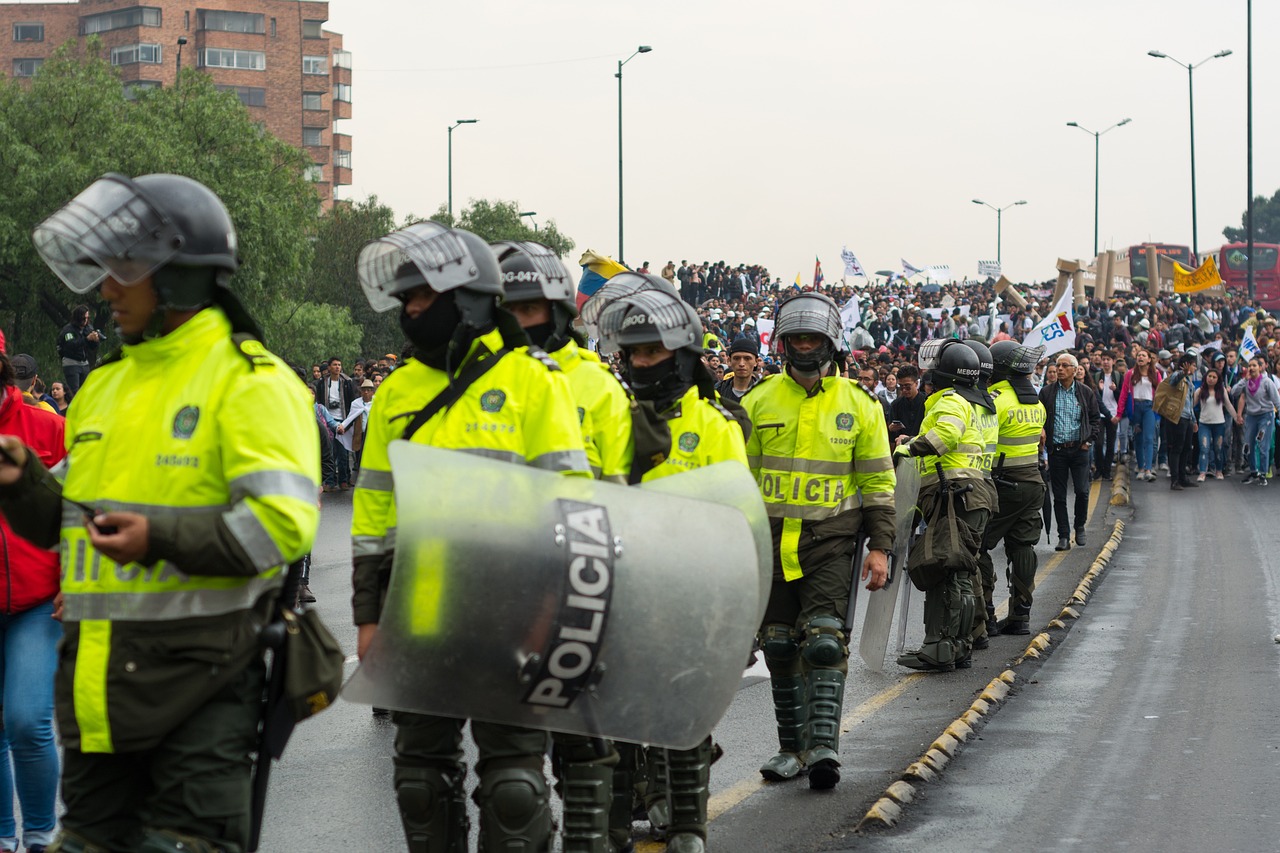
Transcendentalism and Individualism
Transcendentalism, a philosophical movement that emerged in the early 19th century, profoundly shaped Henry David Thoreau's views on individualism and social responsibility. At its core, transcendentalism emphasizes the inherent goodness of people and nature, advocating for self-reliance and personal intuition as guiding principles. Thoreau, a key figure in this movement, believed that individuals should not merely conform to societal norms but instead seek their own truths, even if it meant challenging unjust laws. This notion of individualism is not just about personal freedom; it is also about the moral duty to act against injustice.
Thoreau's writings reflect a deep conviction that each person possesses a unique perspective and a moral compass that should guide their actions. He famously stated, "The only obligation which I have a right to assume is to do at any time what I think right." This statement encapsulates the essence of transcendentalism—encouraging individuals to trust their instincts and judgments over societal expectations. In a world often dominated by conformity, Thoreau's insistence on personal integrity and moral courage serves as a powerful reminder of the importance of individual action in the face of injustice.
Moreover, transcendentalism encourages a profound connection with nature, which Thoreau explored extensively in his works. He believed that nature was a source of inspiration and a place for personal reflection. This connection to the natural world further reinforced his belief in the necessity of individual thought and action. For Thoreau, immersing oneself in nature was not just a form of escape but a means of discovering deeper truths about oneself and society. By observing the simplicity and beauty of nature, individuals could cultivate a sense of purpose and clarity that would empower them to resist societal injustices.
In practical terms, transcendentalism advocates for a few key principles that align closely with Thoreau's philosophy of civil disobedience:
- Self-Reliance: Individuals should trust their own judgment and instincts.
- Nonconformity: Challenging societal norms is essential for personal and social growth.
- Spiritual Connection to Nature: Nature serves as a guide for understanding moral truths.
These principles not only shaped Thoreau's approach to civil disobedience but also laid a foundation for future social movements. By promoting the idea that individuals have a duty to challenge injustice and engage in civil disobedience, Thoreau's transcendentalist beliefs continue to resonate. They remind us that the path to justice often requires stepping outside the boundaries of conformity and embracing the courage to act on our convictions. Thus, transcendentalism and individualism are not just historical concepts; they remain vital to understanding our role in advocating for a just society today.
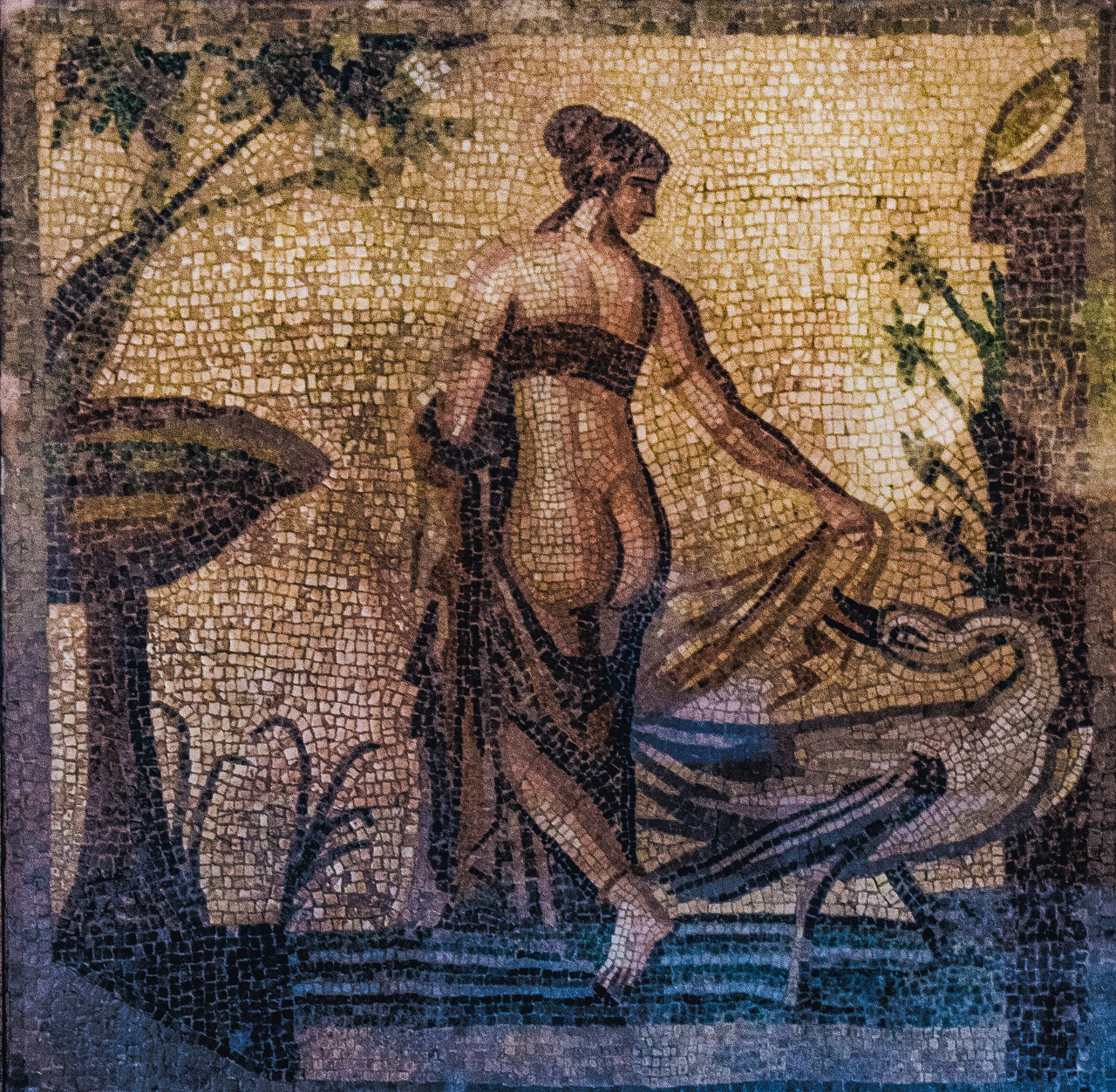
Abolitionist Context
Henry David Thoreau's philosophy of civil disobedience was greatly shaped by the tumultuous socio-political climate of his time, particularly the fervent abolitionist movement. Living in a period marked by intense debates over slavery and the rights of African Americans, Thoreau found himself deeply influenced by the moral and ethical imperatives that abolitionists championed. The abolitionist movement was not just a fight against the institution of slavery; it was a profound struggle for human dignity, justice, and equality. Thoreau, being a man of strong principles, could not remain indifferent to such a pressing issue.
In his essay "Civil Disobedience," Thoreau articulates the belief that individuals have a moral duty to resist unjust laws, a sentiment that resonated powerfully with the abolitionist cause. The idea that one should not comply with laws that perpetuate injustice was a rallying cry for many abolitionists who refused to accept the legality of slavery. Thoreau’s refusal to pay taxes that supported the Mexican-American War—a conflict he viewed as an extension of the slaveholding interests—mirrored the actions of abolitionists who actively resisted a system that dehumanized individuals. This act of defiance was not merely personal; it was a political statement that underscored his commitment to the abolitionist cause.
Thoreau was not alone in his thoughts; he was part of a broader intellectual and activist landscape that included figures like Frederick Douglass and William Lloyd Garrison. These abolitionists argued fervently for the immediate emancipation of enslaved people and the moral imperative to act against the injustices of slavery. Thoreau's writings reflect a shared ethos with these activists, emphasizing the necessity of individual conscience over blind adherence to law. He believed that true justice could only be achieved through personal sacrifice and collective action, a theme that resonated throughout the abolitionist movement.
To understand the abolitionist context of Thoreau's philosophy, we can consider the following key points:
- Shared Values: Thoreau and abolitionists shared a commitment to justice, equality, and human rights.
- Direct Action: Both advocated for direct action as a means of confronting injustice, whether through civil disobedience or abolitionist rallies.
- Moral Responsibility: Thoreau's belief in moral responsibility aligns with the abolitionist view that individuals must act against immoral laws.
This intersection of Thoreau's philosophy with the abolitionist movement illustrates how deeply intertwined social justice issues were during his lifetime. It also highlights the enduring relevance of his ideas, as they continue to inspire modern movements that seek to address systemic injustices. As we explore the legacy of Thoreau's philosophy, it becomes evident that the fight against slavery was not just a historical event but a pivotal moment that shaped the very fabric of American moral and ethical thought.
- What is the main idea behind Thoreau's philosophy of civil disobedience?
Thoreau believed that individuals have a moral obligation to resist and disobey unjust laws, advocating for personal conscience over governmental authority.
- How did the abolitionist movement influence Thoreau?
The abolitionist movement provided a moral framework for Thoreau's ideas, emphasizing the need for active resistance against injustice and the importance of human rights.
- What are some modern movements that draw inspiration from Thoreau's philosophy?
Movements such as Black Lives Matter and climate activism have drawn upon Thoreau's principles, using civil disobedience to challenge systemic injustices.

Key Works and Writings
When we think about Henry David Thoreau, his most significant work, Civil Disobedience, immediately comes to mind. Published in 1849, this essay is not just a piece of literature; it's a powerful manifesto advocating for individual resistance to civil government in moral opposition to an unjust state. Thoreau's eloquent arguments urge readers to prioritize their conscience over the law, suggesting that one must not only be aware of injustice but also act against it. In this essay, he famously stated, "That government is best which governs least," highlighting his belief that minimal government interference allows for greater personal freedom and moral responsibility.
Thoreau's writings are rich with insights that extend beyond mere political philosophy. For instance, his reflections on nature in Walden provide a backdrop for understanding his views on society and individualism. In Walden, Thoreau recounts his experiment in simple living, emphasizing the importance of self-reliance and spiritual discovery in a world filled with material distractions. This book serves as a companion piece to Civil Disobedience, illustrating how a deep connection with nature can foster a stronger sense of personal ethics and social responsibility.
Another notable work is his essay titled Life Without Principle, where he critiques the prevailing values of society, particularly the obsession with profit and material success. Thoreau argues that true fulfillment comes from living a life aligned with one’s principles rather than succumbing to societal pressures. This theme resonates with his call for civil disobedience, as it underscores the idea that one’s moral compass should guide actions, especially in the face of unjust laws.
To better understand Thoreau's philosophy, it’s essential to examine key excerpts from these works. Here’s a brief overview of some of the most impactful ideas:
| Work | Key Idea |
|---|---|
| Civil Disobedience | The moral obligation to resist unjust laws. |
| Walden | The importance of self-reliance and connection to nature. |
| Life Without Principle | Critique of materialism and the pursuit of true fulfillment. |
These works collectively emphasize Thoreau's belief that individuals must act according to their own ethical standards, even when it conflicts with societal norms. His writings encourage us to reflect on our roles as citizens and the responsibilities we bear towards justice and morality.
In today's world, where issues of social justice and environmental sustainability are more pressing than ever, Thoreau's ideas remain relevant. Activists often draw upon his philosophy to justify their actions against what they perceive as systemic injustices. Understanding Thoreau's key works not only enriches our appreciation of his thought but also inspires us to consider how we might embody his principles in our own lives.
- What is the main argument of Thoreau's Civil Disobedience?
Thoreau argues that individuals have a duty to resist and disobey unjust laws, prioritizing personal conscience over governmental authority.
- How does Thoreau's philosophy apply to modern movements?
Many contemporary social movements, such as Black Lives Matter, draw on Thoreau's principles to advocate for justice and challenge systemic inequalities.
- Why is Walden significant in understanding Thoreau's views?
In Walden, Thoreau explores themes of individualism, self-reliance, and the importance of nature, which complement his arguments in Civil Disobedience regarding moral and ethical living.

Civil Disobedience,
This article explores the core principles of Henry David Thoreau's philosophy on civil disobedience, its historical context, and its relevance in contemporary social movements and ethical dilemmas.
Understanding the roots of civil disobedience in Thoreau's work provides insight into its philosophical foundations and the socio-political climate of his time.
Thoreau argued that individuals have a moral obligation to resist unjust laws. This section delves into the ethical dimensions of civil disobedience.
Examining the thinkers and movements that influenced Thoreau’s philosophy, including transcendentalism and abolitionism, sheds light on his motivations for advocating civil disobedience.
This subsection discusses how transcendentalist beliefs shaped Thoreau’s views on personal conscience and social responsibility in the face of injustice.
The impact of the abolitionist movement on Thoreau’s philosophy reveals how contemporary social issues informed his thoughts on civil disobedience.
Thoreau's essays, particularly Civil Disobedience, are pivotal in understanding his arguments. This section analyzes key excerpts and their implications.
Thoreau's ideas resonate in today's social movements. This section explores how activists draw upon his philosophy in their struggles against injustice.
Investigating modern movements, such as Black Lives Matter and climate activism, illustrates how Thoreau's principles continue to inspire contemporary acts of civil disobedience.
This subsection discusses the complexities and criticisms faced by modern activists who adopt Thoreau's philosophy in diverse political climates.
Thoreau's philosophy of civil disobedience has left a lasting legacy. This section examines its influence on notable figures and movements throughout history.
Exploring how Thoreau inspired leaders like Gandhi and Martin Luther King Jr. highlights the enduring relevance of his ideas in the fight for justice.
The inclusion of Thoreau's writings in educational systems emphasizes the importance of his philosophy in teaching civic responsibility and critical thinking.
Civil disobedience is not merely an act of defiance; it is a profound expression of moral conviction against unjust laws. Thoreau, in his seminal essay, articulated the idea that individuals should not only refuse to comply with laws that they find unethical but should also be willing to accept the consequences of their actions. This concept is rooted in the belief that true justice cannot coexist with tyranny. Thoreau famously stated, "Under a government which imprisons any unjustly, the true place for a just man is also a prison." This powerful assertion emphasizes the ethical duty of individuals to stand up against oppression, even if it means facing legal repercussions.
In a world where laws can sometimes be instruments of injustice, civil disobedience serves as a crucial tool for social change. It is a form of nonviolent protest that seeks to highlight the discrepancies between law and morality. By engaging in civil disobedience, individuals challenge the status quo and draw attention to societal issues that demand reform. For instance, Thoreau's own refusal to pay taxes as a protest against slavery and the Mexican-American War exemplifies how personal action can resonate with broader movements for justice.
Moreover, civil disobedience is often characterized by its public nature. Activists typically engage in these acts openly, inviting dialogue and encouraging others to reflect on the moral implications of their actions. This transparency is vital, as it fosters a collective consciousness that can galvanize communities toward change. Whether through sit-ins, marches, or other forms of protest, the goal remains the same: to awaken society to the injustices that persist within its legal framework.
However, the practice of civil disobedience is not without its challenges. Critics argue that such acts can lead to chaos or undermine the rule of law. Yet, Thoreau would counter that the true chaos lies in compliance with unjust systems. He believed that a society that condones injustice is far more dangerous than a society that embraces civil disobedience as a means of rectifying wrongs.
Ultimately, civil disobedience is a testament to the power of individual conscience in shaping the moral landscape of society. It calls for courage and conviction, urging individuals to rise above complacency and take a stand against injustice. As we reflect on Thoreau's philosophy, we are reminded that the fight for justice is often fraught with challenges, but it is a fight worth engaging in.
- What is civil disobedience? Civil disobedience is the act of intentionally breaking laws or regulations to protest against policies deemed unjust.
- How did Thoreau influence modern activism? Thoreau's philosophy of civil disobedience has inspired numerous social movements, emphasizing the importance of moral resistance to injustice.
- Is civil disobedience effective? Many argue that civil disobedience can effectively raise awareness and prompt social change, as seen in various historical movements.
- What are the risks of civil disobedience? Engaging in civil disobedience can lead to legal consequences, including arrest, but many activists view these risks as necessary for the greater good.

are pivotal in understanding his arguments. This section analyzes key excerpts and their implications.
Understanding the roots of civil disobedience in Thoreau's work provides insight into its philosophical foundations and the socio-political climate of his time.
Thoreau argued that individuals have a moral obligation to resist unjust laws. This section delves into the ethical dimensions of civil disobedience.
Examining the thinkers and movements that influenced Thoreau’s philosophy, including transcendentalism and abolitionism, sheds light on his motivations for advocating civil disobedience.
This subsection discusses how transcendentalist beliefs shaped Thoreau’s views on personal conscience and social responsibility in the face of injustice.
The impact of the abolitionist movement on Thoreau’s philosophy reveals how contemporary social issues informed his thoughts on civil disobedience.
Thoreau's essays, particularly Civil Disobedience, are pivotal in understanding his arguments. This section analyzes key excerpts and their implications.
In Civil Disobedience, Thoreau famously asserts, "That government is best which governs least." This statement encapsulates his belief that governmental authority often infringes upon individual liberties. Thoreau’s emphasis on minimal government intervention resonates deeply with the idea that individuals should prioritize their conscience over the dictates of the state. He argues that when laws are unjust, it is not only a right but also a duty for individuals to resist them. This idea raises a fundamental question: how do we define justice, and who gets to decide?
Another key excerpt from Thoreau's essay states, "I cannot for an instant recognize that political organization as my government which is the slave's government also." Here, Thoreau poignantly highlights the moral conflict arising from participating in a system that perpetuates injustice. This quote serves as a powerful reminder of the interconnectedness of individual actions and societal structures, urging readers to reflect on their roles within these systems.
Thoreau also discusses the concept of nonviolent resistance, suggesting that individuals should not comply with laws that contradict their moral beliefs. He famously practiced this philosophy by refusing to pay taxes that would support the Mexican-American War, which he viewed as an unjust conflict. His act of civil disobedience led to his brief imprisonment, a personal sacrifice that underscored his commitment to his principles. This act raises an important implication: the personal cost of standing up for one's beliefs can be significant, yet it can also serve as a catalyst for broader societal change.
To better understand Thoreau's arguments, we can analyze the following table summarizing key excerpts from Civil Disobedience and their implications:
| Excerpt | Implication |
|---|---|
| "That government is best which governs least." | Encourages minimal government interference in personal liberties. |
| "I cannot for an instant recognize that political organization as my government which is the slave's government also." | Highlights the moral dilemma of participating in an unjust system. |
| "Under a government which imprisons any unjustly, the true place for a just man is also a prison." | Suggests that moral integrity may require accepting personal sacrifice. |
These excerpts serve as a foundation for understanding Thoreau's philosophy and its enduring relevance. They challenge readers to consider their own positions within societal structures and encourage a critical examination of the laws that govern us. Thoreau's work continues to inspire those who seek justice, providing a framework for understanding the moral imperative of civil disobedience.
Thoreau's ideas resonate in today's social movements. This section explores how activists draw upon his philosophy in their struggles against injustice.
Investigating modern movements, such as Black Lives Matter and climate activism, illustrates how Thoreau's principles continue to inspire contemporary acts of civil disobedience.
This subsection discusses the complexities and criticisms faced by modern activists who adopt Thoreau's philosophy in diverse political climates.
Thoreau's philosophy of civil disobedience has left a lasting legacy. This section examines its influence on notable figures and movements throughout history.
Exploring how Thoreau inspired leaders like Gandhi and Martin Luther King Jr. highlights the enduring relevance of his ideas in the fight for justice.
The inclusion of Thoreau's writings in educational systems emphasizes the importance of his philosophy in teaching civic responsibility and critical thinking.
- What is civil disobedience? Civil disobedience is the act of peacefully refusing to comply with laws or governmental demands that are considered unjust.
- How did Thoreau influence modern activism? Thoreau's emphasis on individual conscience and moral responsibility continues to inspire activists in various movements today.
- What are some key principles of Thoreau's philosophy? Key principles include minimal government interference, the moral imperative to resist unjust laws, and the importance of individual conscience.
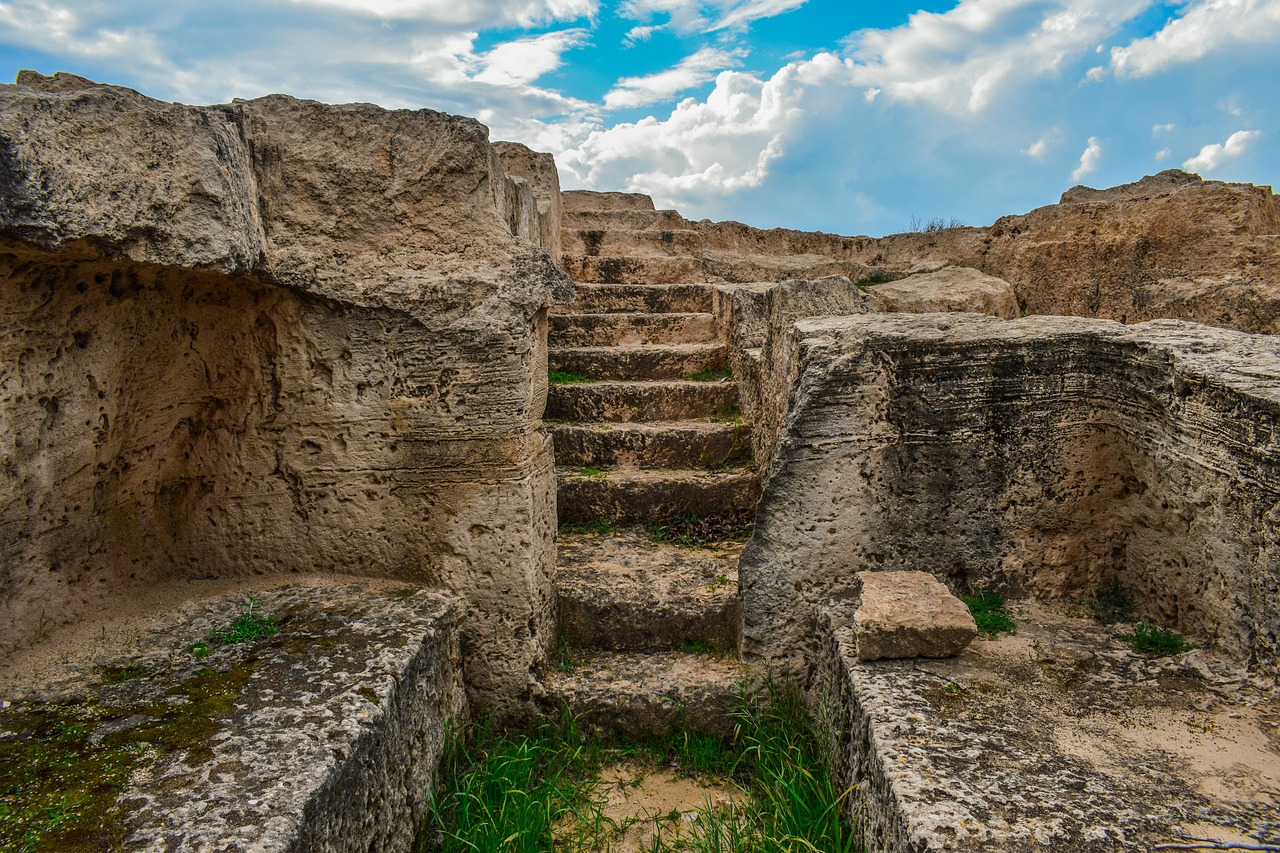
Modern Applications of Thoreau's Philosophy
Henry David Thoreau's philosophy of civil disobedience is not just a relic of the past; it's a living, breathing doctrine that continues to inspire and guide modern activists. In an age where social injustice still permeates our societies, Thoreau's call for individuals to resist unjust laws resonates louder than ever. But how exactly do his principles manifest in today's social movements? Let's dive into the heart of contemporary activism and see how Thoreau's ideas are woven into the fabric of modern resistance.
One of the most striking aspects of Thoreau's philosophy is its emphasis on individual conscience. Activists today are increasingly relying on their moral compass to guide their actions against systemic injustices. For instance, the Black Lives Matter movement embodies Thoreau's spirit of civil disobedience through peaceful protests and sit-ins, challenging laws and practices that perpetuate racial inequality. Just as Thoreau refused to pay taxes that funded the Mexican-American War, modern activists refuse to be complicit in systems they deem unjust.
Moreover, the climate activism movement has also drawn heavily from Thoreau’s teachings. Young activists, inspired by Thoreau's love for nature and his belief in the interconnectedness of all life, have taken to the streets to demand urgent action against climate change. They understand that just as Thoreau stood against the injustices of his time, they too must stand against environmental degradation, which disproportionately affects marginalized communities. Thoreau's assertion that "the only obligation which I have a right to assume is to do at any time what I think right" resonates deeply with these activists, encouraging them to act in accordance with their values, even when it means breaking the law.
However, the application of Thoreau's philosophy in modern contexts is not without its challenges. Activists often face criticism for their methods, with detractors questioning the effectiveness of civil disobedience in achieving tangible results. Some argue that more conventional approaches, such as lobbying or voting, might yield better outcomes. Yet, history shows us that civil disobedience has often been a catalyst for change. It forces society to confront uncomfortable truths, igniting discussions that might otherwise remain buried.
In this light, it’s essential to recognize that Thoreau's ideas are not merely theoretical; they provide a framework for action. Activists today are not just echoing his words; they are embodying his principles in their fight for justice. Whether it's through organizing protests, engaging in nonviolent resistance, or using social media to raise awareness, they are continually redefining what it means to challenge injustice. Thoreau's legacy encourages a sense of responsibility to act, reminding us that silence in the face of wrongdoing is complicity.
To summarize, the modern applications of Thoreau’s philosophy of civil disobedience are vibrant and multifaceted. From movements like Black Lives Matter to climate activism, his teachings continue to inspire a new generation of activists. They remind us that standing up for what is right often requires courage, conviction, and a willingness to challenge the status quo. As we navigate the complexities of contemporary social issues, Thoreau's insights serve as a beacon, urging us to reflect on our own responsibilities as citizens and advocates for change.
- What is civil disobedience? Civil disobedience is the active, professed refusal to obey certain laws or demands of a government, often in a nonviolent manner.
- How did Thoreau influence modern movements? Thoreau's emphasis on individual conscience and moral responsibility has inspired many contemporary social movements to adopt civil disobedience as a strategy for change.
- Are there risks associated with civil disobedience? Yes, participants may face legal consequences, public backlash, or personal safety risks, but many believe the moral imperative outweighs these risks.

Examples from Recent Movements
In recent years, the philosophy of civil disobedience as articulated by Henry David Thoreau has found new life in various social movements. Activists today are not just echoing Thoreau's words; they are embodying his spirit in their relentless fight against injustice. For instance, the Black Lives Matter movement has adopted tactics of civil disobedience to challenge systemic racism and police brutality. Protesters have taken to the streets, often blocking traffic and staging sit-ins, echoing Thoreau's assertion that individuals must act against unjust laws, even if it means facing arrest.
Similarly, the climate activism movement, led by figures such as Greta Thunberg and organizations like Extinction Rebellion, has embraced civil disobedience as a means to draw attention to the climate crisis. These activists have engaged in non-violent protests, including blocking roads and occupying public spaces, to demand urgent action from governments. Their actions resonate with Thoreau's belief that moral imperatives should outweigh legal constraints when confronting injustice.
One striking example is the Extinction Rebellion campaign, which has organized mass protests around the world. In 2019, thousands of activists descended on London, disrupting daily life to emphasize the urgency of climate action. Their approach, reminiscent of Thoreau's own methods, illustrates a profound commitment to civil disobedience as a tool for social change. They argue that the environmental crisis is so severe that traditional forms of protest are no longer sufficient, compelling them to take more drastic measures.
Moreover, the Me Too movement has also leveraged civil disobedience to challenge sexual harassment and assault. Activists have staged protests and sit-ins, demanding accountability from powerful figures. This movement's insistence on speaking truth to power reflects Thoreau's idea that individuals must prioritize their conscience over compliance with societal norms.
In all these movements, a common thread emerges: the recognition that civil disobedience is not merely an act of defiance but a profound expression of moral conviction. Activists today, much like Thoreau, understand that the fight for justice often requires stepping outside the bounds of conventional legality. The courage to stand up against injustice, even at personal cost, is a hallmark of contemporary activism, echoing the timeless principles laid down by Thoreau over a century ago.
- What is civil disobedience? Civil disobedience is the active, professed refusal to obey certain laws, demands, and commands of a government or occupying power, usually through nonviolent means.
- How did Thoreau influence modern movements? Thoreau's philosophy of civil disobedience has inspired many modern movements, emphasizing the moral obligation to resist unjust laws.
- Can civil disobedience be justified? Many argue it can be justified when laws are deemed unjust and when all other avenues of change have been exhausted.
- What are some historical examples of civil disobedience? Historical examples include the American civil rights movement, Gandhi's nonviolent resistance in India, and the anti-apartheid movement in South Africa.

Challenges to Civil Disobedience Today
The concept of civil disobedience, while noble in its intentions, faces a myriad of challenges in today’s complex socio-political landscape. In a world where information travels at lightning speed and opinions are more polarized than ever, the act of resisting unjust laws is not as straightforward as it once was. **Activists today must navigate a labyrinth of legal repercussions, social media scrutiny, and varying public opinions**, making the execution of civil disobedience a delicate balancing act.
One of the primary challenges is the **increased surveillance and policing** of protests. With the advent of advanced technology, authorities can monitor gatherings and track individuals with unprecedented precision. This creates a climate of fear among potential participants, who may worry not only about immediate consequences but also about long-term repercussions on their personal lives and careers. For example, many activists have reported being targeted by law enforcement for their involvement in protests, with some facing criminal charges that can affect their future job prospects. This reality can deter individuals from participating in civil disobedience, as they weigh the risks against the potential impact of their actions.
Additionally, the **diversity of thought within activist movements** can lead to internal conflicts that hinder unified action. Different groups may have varying philosophies about the best methods of resistance. For instance, while some advocate for peaceful protests and dialogue, others may believe that more aggressive tactics are necessary to incite change. This discord can dilute the effectiveness of movements, as resources and energies are often spent on internal debates rather than on addressing the injustices at hand.
Moreover, the **rise of social media** has transformed the landscape of activism. While it provides a platform for raising awareness and mobilizing support, it also means that movements are constantly under the public eye. This scrutiny can lead to a phenomenon known as “performative activism,” where individuals participate in protests or online campaigns primarily for social media validation rather than genuine commitment to the cause. This superficial engagement can undermine the seriousness of civil disobedience, making it seem more like a trend than a moral imperative.
Another significant challenge is the **legal ramifications** of civil disobedience. In many jurisdictions, laws that were once viewed as unjust have been codified, creating a legal framework that can penalize those who resist. This is particularly evident in cases where laws protect corporate interests over community rights, such as environmental regulations that favor industrial development at the expense of local ecosystems. Activists must grapple with the reality that their actions, while morally justified, may lead to arrest and prosecution, which can deter participation and fracture movements.
Finally, the **global context** of civil disobedience cannot be ignored. In an increasingly interconnected world, movements are often influenced by international events and perspectives. Activists may find themselves aligning with causes that span borders, yet the cultural and political nuances of different regions can complicate the discourse. For instance, what is considered an act of bravery in one country may be viewed as reckless in another, leading to confusion and potential backlash against movements that seek solidarity across nations.
In conclusion, while the spirit of civil disobedience remains a powerful tool for social change, it is essential for contemporary activists to navigate these challenges with a clear understanding of the landscape they are operating within. By acknowledging the complexities of modern resistance, they can develop strategies that not only honor Thoreau's legacy but also adapt to the realities of today's world.
- What is civil disobedience? Civil disobedience is the active refusal to obey certain laws or demands of a government, typically on moral grounds.
- How has civil disobedience evolved over time? Civil disobedience has evolved from a largely philosophical concept into a practical tool for social movements, adapting to technological and societal changes.
- What are some modern examples of civil disobedience? Modern examples include the Black Lives Matter movement, climate strikes, and various protests against social injustices.
- What risks do activists face when practicing civil disobedience? Activists may face legal repercussions, social ostracism, and personal safety risks when engaging in civil disobedience.

Legacy and Influence
Henry David Thoreau's philosophy of civil disobedience has not only left a profound mark on the landscape of American thought but has also reverberated across the globe, influencing countless movements and leaders. His ideas, articulated in his seminal essay Civil Disobedience, continue to serve as a beacon for those who challenge injustice and advocate for change. Thoreau's assertion that individuals must prioritize their conscience over the dictates of the government has inspired generations to rise against oppression.
One of the most striking aspects of Thoreau's legacy is how his philosophy has been adopted and adapted by various social movements throughout history. From the abolition of slavery to the civil rights movement, Thoreau's call for moral action against unjust laws has resonated deeply with activists seeking to rectify societal wrongs. His influence can be seen in the strategies employed by leaders such as Mahatma Gandhi and Martin Luther King Jr., both of whom embraced nonviolent resistance as a means to confront systemic injustice.
To illustrate this influence, consider the following table that highlights key figures and movements that have drawn inspiration from Thoreau:
| Figure/Movement | Connection to Thoreau |
|---|---|
| Mahatma Gandhi | Utilized nonviolent civil disobedience to challenge British colonial rule in India. |
| Martin Luther King Jr. | Advocated for racial equality through peaceful protests and civil disobedience. |
| Women’s Suffrage Movement | Employed civil disobedience to fight for women’s voting rights in the early 20th century. |
| Environmental Activism | Modern activists invoke Thoreau’s principles in their fight against climate change and ecological degradation. |
Moreover, Thoreau's philosophy has found its way into educational curricula, emphasizing the importance of civic responsibility and critical thinking. Schools and universities often include his writings in their literature and philosophy courses, encouraging students to reflect on the ethical implications of laws and governance. This educational approach fosters a generation of thinkers who are not only aware of their rights but also equipped to advocate for justice in their communities.
As we navigate the complexities of modern society, Thoreau's legacy serves as a reminder of the power of individual conscience and the importance of standing up against injustice. His teachings challenge us to consider our own roles in the fabric of society and urge us to act when we encounter moral dilemmas. In a world where the lines between right and wrong can often blur, Thoreau's philosophy remains a crucial touchstone for those committed to social change.
- What is civil disobedience? Civil disobedience is the act of intentionally disobeying a law or regulation as a form of protest against perceived injustice.
- How did Thoreau's experiences shape his philosophy? Thoreau's experiences with government injustices, particularly his opposition to slavery and the Mexican-American War, profoundly influenced his beliefs on civil disobedience.
- Can civil disobedience be justified? Many argue that civil disobedience is justified when laws are unjust or violate fundamental human rights, as it serves to raise awareness and provoke change.

Influence on Key Figures
Henry David Thoreau's philosophy of civil disobedience has profoundly influenced numerous key figures throughout history, shaping the course of social justice movements. One of the most notable examples is Mahatma Gandhi, who adapted Thoreau's principles to develop his philosophy of nonviolent resistance. Gandhi was inspired by Thoreau's essay Civil Disobedience, particularly the idea that individuals must act according to their conscience, even when it means defying unjust laws. This notion became a cornerstone of Gandhi's campaign against British colonial rule in India, leading to significant social and political change.
Similarly, Martin Luther King Jr. drew heavily from Thoreau's ideas as he led the Civil Rights Movement in the United States. King believed that nonviolent civil disobedience was a moral weapon against racial injustice. In his famous Letter from Birmingham Jail, he echoed Thoreau's sentiments by asserting that “injustice anywhere is a threat to justice everywhere.” This connection highlights how Thoreau's philosophy transcended time and geography, providing a moral framework for activists fighting oppression.
Moreover, Thoreau's influence can be seen in various contemporary movements advocating for social justice and environmental sustainability. Activists today continue to reference Thoreau's work as they challenge systemic injustices and promote ethical responsibility. For instance, the climate activism movement often incorporates Thoreau's belief in the importance of individual action against societal wrongs, as seen in protests against environmental degradation and corporate irresponsibility.
The legacy of Thoreau's philosophy is not just confined to historical figures; it resonates with everyday individuals who feel compelled to stand against injustice. As people engage in acts of civil disobedience, whether through peaceful protests or digital activism, they embody the spirit of Thoreau's teachings. This ongoing relevance of Thoreau's ideas serves as a reminder that the fight for justice is a continuous journey, requiring courage and moral clarity.
In summary, the influence of Thoreau's philosophy on figures like Gandhi and King illustrates the profound impact of his thoughts on civil disobedience. Their legacies, intertwined with Thoreau’s ideals, continue to inspire new generations of activists seeking to challenge injustice and advocate for a more equitable society.
- What is civil disobedience? Civil disobedience is the active, professed refusal to obey certain laws, demands, or commands of a government or occupying power, often characterized by nonviolent resistance.
- How did Thoreau define civil disobedience? Thoreau defined civil disobedience as a moral duty to resist unjust laws, emphasizing that individuals should follow their conscience rather than blindly obeying government mandates.
- Who are some other key figures influenced by Thoreau? Besides Gandhi and King, other figures influenced by Thoreau include Nelson Mandela and Cesar Chavez, both of whom incorporated principles of civil disobedience in their struggles for justice.
- Why is Thoreau's philosophy still relevant today? Thoreau's philosophy remains relevant because it addresses the ethical dimensions of resistance against injustice, inspiring modern movements that advocate for civil rights, environmental justice, and social change.

Thoreau in Educational Curricula
Henry David Thoreau's philosophy of civil disobedience is not just an intellectual exercise; it has become a fundamental part of educational curricula across various levels. Schools and universities recognize the importance of Thoreau's ideas in fostering critical thinking and civic engagement among students. By incorporating his works, educators aim to inspire a new generation to question authority and understand the moral imperatives behind standing up against injustice.
Thoreau's essay, Civil Disobedience, serves as a cornerstone in many literature and philosophy courses. It challenges students to reflect on their own values and the societal norms that govern their lives. This essay, along with his other writings, encourages discussions about the role of government, the nature of justice, and the responsibilities of individuals in a democracy. Such discussions are crucial, especially in an age where social issues are at the forefront of public consciousness.
Moreover, the inclusion of Thoreau's work in educational settings often aligns with broader themes in American history and literature, providing students with a comprehensive understanding of the socio-political context of his time. For instance, when exploring the abolitionist movement or transcendentalism, educators can draw connections to Thoreau’s thoughts, highlighting how his ideas were both a product of and a response to the turbulent events of the 19th century.
In practical terms, many educational institutions have developed curricula that focus on:
- The ethical dimensions of civil disobedience.
- The historical context of Thoreau's works.
- Contemporary applications of his philosophy in modern social movements.
This multifaceted approach not only deepens students' understanding of Thoreau but also equips them with the tools to engage thoughtfully with current events. By grappling with Thoreau's arguments, students learn to appreciate the complexities of social justice issues and the importance of individual agency in effecting change.
As we look toward the future, the relevance of Thoreau’s philosophy in educational curricula is likely to grow. In a world that often seems divided and chaotic, his call for introspection and moral courage resonates more than ever. Educators who prioritize Thoreau's teachings are not just imparting knowledge; they are nurturing informed, compassionate citizens who are prepared to challenge injustice and advocate for a better society.
- Why is Thoreau's philosophy of civil disobedience relevant today?
Thoreau's ideas encourage individuals to question unjust laws and take action against societal issues, which is crucial in today's political climate. - How can educators effectively teach Thoreau's works?
By integrating his essays into discussions about ethics, history, and modern social movements, educators can create a rich learning experience. - What impact did Thoreau have on future leaders?
Thoreau's philosophy influenced notable figures like Gandhi and Martin Luther King Jr., who drew upon his ideas in their own struggles for justice.
Frequently Asked Questions
- What is civil disobedience according to Thoreau?
Civil disobedience, as articulated by Thoreau, is the act of intentionally breaking laws that are deemed unjust. He believed that individuals have a moral obligation to resist such laws and that this resistance is a form of social responsibility.
- How did Thoreau's personal beliefs influence his philosophy?
Thoreau's philosophy was deeply influenced by transcendentalism, which emphasized individual conscience and the inherent goodness of people. His belief in personal integrity and moral duty drove him to advocate for civil disobedience as a means of opposing injustice.
- What historical context shaped Thoreau's views on civil disobedience?
Thoreau's views were shaped by the socio-political climate of his time, particularly the abolitionist movement. The fight against slavery highlighted the need for individuals to stand up against laws that perpetuated injustice, which inspired Thoreau's arguments for civil disobedience.
- How is Thoreau's philosophy relevant to modern social movements?
Thoreau's ideas continue to resonate today, as activists in movements like Black Lives Matter and climate activism draw upon his philosophy to justify their actions against perceived injustices. His call for moral resistance remains a powerful tool for contemporary activists.
- What challenges do modern activists face when practicing civil disobedience?
Modern activists encounter various challenges, including legal repercussions, public backlash, and the complexities of navigating diverse political climates. Thoreau's philosophy provides a framework for understanding these challenges, yet the execution of civil disobedience can be fraught with difficulties.
- Who were some key figures influenced by Thoreau's philosophy?
Thoreau's philosophy has inspired numerous leaders throughout history, including Mahatma Gandhi and Martin Luther King Jr. Both utilized his principles of civil disobedience in their own struggles for justice, demonstrating the lasting impact of Thoreau's ideas.
- Why is Thoreau included in educational curricula?
Thoreau's writings are included in educational systems to teach students about civic responsibility, critical thinking, and the importance of standing up against injustice. His philosophy encourages young minds to engage with social issues and think deeply about their moral obligations.


